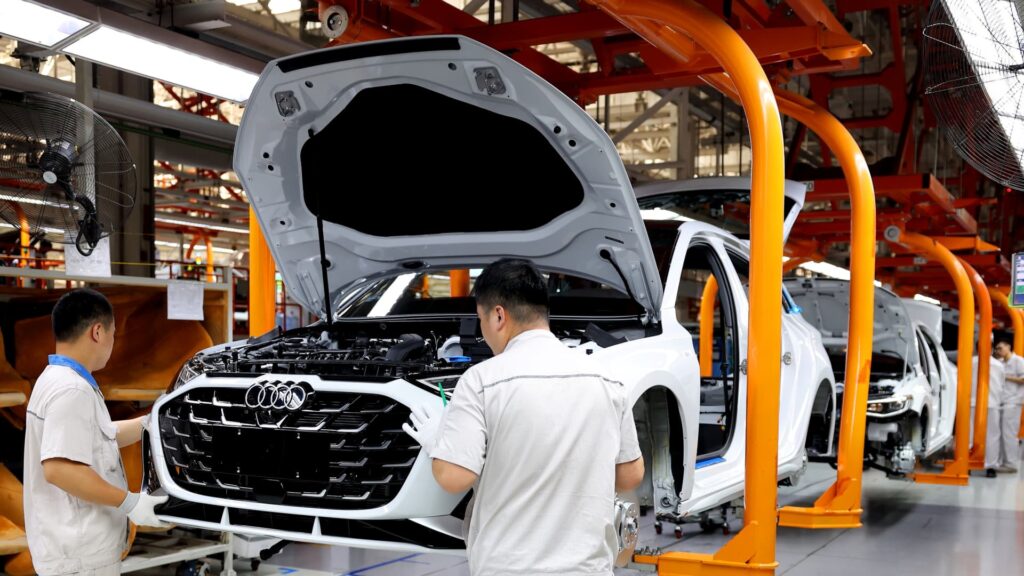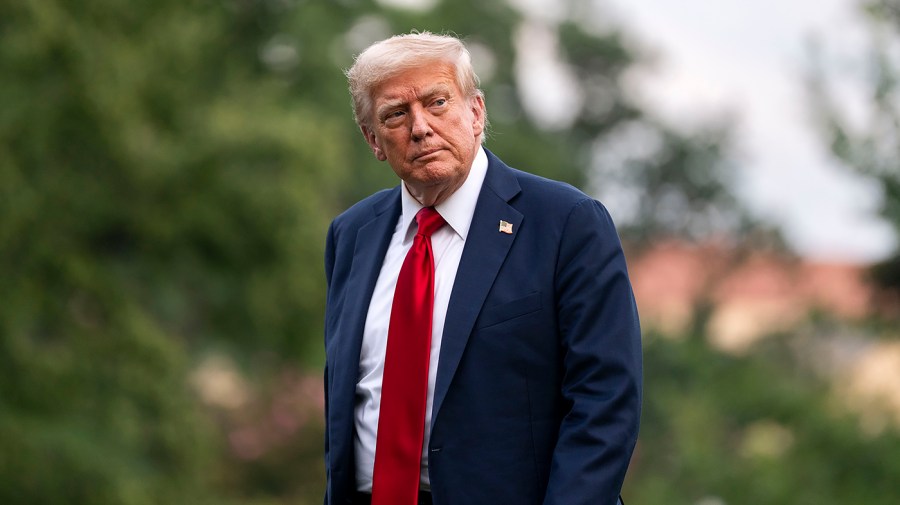]
As the NBA playoffs captivate millions of basketball fans across the United States, demand for athletic shoes and gear is rising and projected to surge over the next decade. The playoffs aren’t just a showcase of pro basketball talent; they are also a massive marketing opportunity for such sportswear giants as Nike and Adidas, whose products dominate the courts.
Yet even as these brands enjoy heightened visibility, their supply chains face a looming crisis. President Trump’s tariff hike of 46 percent threatens Vietnam, the key manufacturing hub for these brands.
Despite the pause on some reciprocal tariffs announced last month, as the primary producer of high-performance basketball shoes and apparel, Vietnam’s booming footwear industry now faces a significant financial strain that could disrupt both the industry and U.S. consumers.
Vietnam has been a major beneficiary of shifting supply chains, particularly as companies moved operations out of China to avoid previous tariffs. Today, over half of Nike’s footwear production and a significant share of Adidas’s manufacturing take place in Vietnam.
However, Trump’s aggressive tariff policy could drastically increase costs for these companies, forcing them to either pass price hikes onto consumers or look for alternative production sites, both of which would create significant disruptions.
Higher tariffs could also stifle investment in Vietnam’s factories, potentially causing layoffs and reducing economic growth in a nation that has become one of the U.S.’s key economic partners. With sportswear brands deeply embedded in Vietnam’s economy, these tariffs risk undermining a vital segment of the global supply chain at a time when demand is surging.
The punitive tariff imposed by Washington on Vietnam threatens to strain ties between the two nations at a critical moment, just as they mark 50 years since the fall of Saigon this week.
As strategic comprehensive partners, the U.S. and Vietnam have built a relationship centered on economic cooperation, regional stability and shared security interests in the Indo-Pacific. However, such a steep tariff risks disrupting supply chains, weakening trust and pushing Vietnam to seek alternative economic alliances, potentially undermining U.S. influence in the region at a time when geopolitical stability is paramount.
The White House’s draconian position is buttressed by the $123.5 billion trade deficit with Vietnam, making it the third largest behind only China and Mexico, claims Morningstar analyst David Swartz.
In response, Vietnam officials have been attempting to negotiate their way forward even before being handed this onerous tariff levy. These diplomatic concessions and pledges include supporting the repatriation of Vietnamese nationals detained in the U.S.
The increased tariffs targeting Vietnam will primarily be paid by multinational companies that employ hundreds of thousands of workers in the country. However, these costs are likely to be passed down the supply chain, ultimately affecting American consumers.
For instance, the price of a pair of Nike shoes, like the Nike Air Force 1, which are largely manufactured in Vietnam, is expected to rise from an average cost of $115 to more than $150 as a result of these new tariffs.
Most economists agree that tariffs function as a tax on businesses, but in practice, companies typically offset these costs by raising prices, reducing profit margins or shifting production elsewhere. In the case of Vietnam, the impact extends beyond corporations — it also affects the country’s workforce, which relies on foreign investments and manufacturing jobs to sustain livelihoods.
For instance, Nike employs more than 130,000 Vietnamese citizens in factories manufacturing Nike-branded products, and a significant proportion of these workers are women. In its 2024 fiscal year, Nike produced 50 percent of its footwear and 28 percent of its apparel in Vietnam.
Nike’s extensive manufacturing presence in Vietnam has created significant employment opportunities, particularly for women, who make up approximately 80 percent of the workforce in its factories. Many of these women come from poor rural areas in the central and northern provinces, seeking better wages and financial stability.
With at least 75 contracted factories across the country, Nike has become a key driver of economic activity and job creation.
By employing a vast number of women, Nike has contributed to increasing female workforce participation, helping many to achieve financial independence and support their families. For many of these workers, employment in Nike’s factories represents their first experience in the formal economy, granting them access to steady incomes, legal protections and opportunities for skill development.
Beyond financial benefits, Nike’s employment of women in Vietnam has also played a role in fostering social and economic empowerment. Steady wages enable women to invest in their education, healthcare, and families, breaking cycles of poverty that have persisted for generations.
Moreover, working in industrial settings provides them with skills and experiences that can translate into broader career opportunities. Many of these women become role models within their communities, inspiring younger generations to pursue work and education.
Meanwhile, U.S. consumers will face higher costs for everyday goods, particularly in industries heavily dependent on Vietnamese exports, such as footwear, electronics and textiles.
Frank Lavin, former undersecretary of Commerce for International Trade, has publicly criticized Trump’s “scattershot” tariffs strategy for causing contradictory outcomes, hurting the U.S. economy, while increasing volatility. As the U.S. becomes a less reliable trading partner, he sees other nations and businesses seeking opportunities elsewhere.
Trump’s tariffs on key trading partners such as Vietnam occur at a time when the global economy is, and continues to be, highly interconnected. In an era defined by globalization, such protectionist measures not only disrupt complex supply chains but also strain diplomatic and economic relations.
This marks a broader shift toward a more fragmented and recalibrated global order — a “rewired” world where cooperative frameworks are increasingly undermined, resulting in adverse consequences for a wide range of stakeholders across both developed and developing economies.
Still, as the NBA playoffs play on through the championships, sports fans may soon see higher prices and limited athletic apparel options. What seems like economic protectionism could ultimately backfire, hurting U.S. consumers and straining a vital trade partnership between the U.S. and Vietnam.
James Borton is a senior fellow at Johns Hopkins-SAIS Foreign Policy Institute and the author of “Dispatches from the South China Sea: Navigating to Common Ground.”








